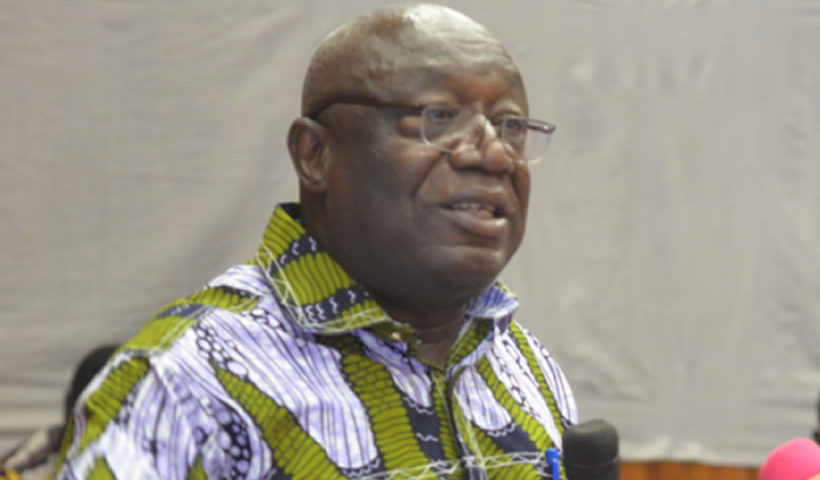The Minister for Environment, Science, Technology and Innovation, Hon. Kwaku Afriyie has said that the increase in nuclear applications in medical practice, agriculture, research, education, extractive and other industrial activities as well as the advances made in the nuclear power programme in Ghana requires the establishment of competence and capacity in internal dosimetry.
Speaking at the 65th Regular Session of the International Atomic Energy Agency (IAEA) General Conference, held in Vienna, Austria, the Minister noted that a national dosimetry laboratory has been established at the Ghana Atomic Energy Commission (GAEC) to detect and measure contamination along with a functional, physical/biological dosimetry laboratory capable of performing cytogenetic and gene expression analysis for dose estimation.
He used the occasion to applaud the Director General of the IAEA for his exceptional leadership during this difficult period of the COVID-19 pandemic in ensuring minimal disruption of the activities of the Agency.
“The Agency’s assistance to Member States including Ghana in the fight against the pandemic is greatly appreciated,” he emphasized.
According to Hon. Afriyie, despite the difficulties thrust upon the country by the COVID-19 pandemic, Ghana has demonstrated resilience in making progress in negotiating and concluding its country’s programme framework with the Agency which is due to be signed alongside the General Conference.
He further stated that Ghana appreciates the work and contributions of all Agency staff that have provided invaluable support to helping Ghana achieve this milestone in particular, the Deputy Director General for Technical Cooperation.
On Ghana’s Nuclear Power Programme, the Minister disclosed that Ghana has issued Request For Information (RFI) from various vendor countries seeking to establish the technology for the programme.
“We have also installed and integrated into the national seismic network, the seismic equipment that was procured through cost sharing with the IAEA. We are working assiduously towards the attainment of the needed social license especially at the candidate sites. Ghana Nuclear Power Programme Organization (GNPPO) is, therefore, training and equipping the media with the right information to disseminate to the public,” he said.
As the country prepares itself for the Nuclear Power Programme, Hon. Kwaku Afriyie further stated that the Nuclear Regulatory Authority (NRA) was receiving technical support from the European Union’s Instrument for Nuclear Safety to help in the development of the Authority’s regulatory structures.
He also said Ghana was among dozens of Countries, which received Real time RT-PCR (COVID-19 Testing Equipment) to detect the COVID-19 virus from the IAEA and additionally, the IAEA/FAO Animal Protection and Health Laboratory has also helped countries including Ghana to detect animal to human diseases and also to test for COVID-19 SAR-2 virus as part of the ZODIAC project.
“Ghana joined 33 other countries in five continents to assess international variations in CT utilization protocols and radiation doses in patients with coronavirus disease (COVID-19) pneumonia,” he stated.
The School of Nuclear and Allied Sciences (SNAS), the Minister said continues to educate and train young scientists in the nuclear field and graduated twenty-four Masters students and six PhDs in 2020. “Ghana is participating in the Sahel Project, a Technical Cooperation Project which involves investigation of trans-boundary aquifers for groundwater quality, identification of sources of pollution, quantification of recharge to aquifers and impact of climate change on water resources,” he said.
This, he added that Ghana’s focus is on the North East and North West parts of the country which fall in the Volta River Basin sharing the basin with Burkina Faso, Mali, Niger, Benin and Togo and that Ghana was thus working with Burkina Faso, Niger, Benin and Togo in what has been classified as Liptako Gourma-Upper Volta Aquifer System.
“Results obtained so far, with the application of isotope hydrology techniques, show that old groundwater occurs in about 50% of the area, which hitherto was unknown. Ghana was selected alongside Benin, Niger, Cameroun and Nigeria to pilot the IAEA Water Availability Enhancement Methodology for water resources management,” he posited.
Hon. Afriyie said the IAEA has taken steps to assist Ghana on plastics management through the NUTEC Plastics initiative, which combines irradiation and isotopic techniques to combat plastic pollution through designated modules like the Technical Cooperation (TC) and Coordinated Research Project (CRP).
The project’s objective, according to the Minister was to accelerate the transition towards a circular plastic economy by adopting and applying nuclear science and technology solutions while the outcome was to improve the use of nuclear-based technology in monitoring marine plastic pollution and plastic recycling practices.
Ghana, he maintained was committed to make this project a success as a way to boost the country’s efforts to control plastic waste.
Among the Ghanaian delegation to the 65th General Conference of the IAEA led by Hon. Dr. Kwaku Afriyie, include Hon William Owuraku Aidoo, Deputy Minister for Energy, H.E. Philbert Isaac Kobina Abaka Johnson, Ambassador and Permanent Representative to Austria & the UN Offices in Vienna, Dr. Kwaku Aning, Board Chair/GAEC, Professor Benjamin Jabez Nyarko, D-G/GAEC, Dr. Nii Kwashie Allotey, Director General of the Nuclear Regulatory Authority, Dr. Stephen Yamoah, Director Nuclear Power Ghana and Dr. Seth Debrah, Director of the Nuclear Power Institute.
Source: Accra Times Report

